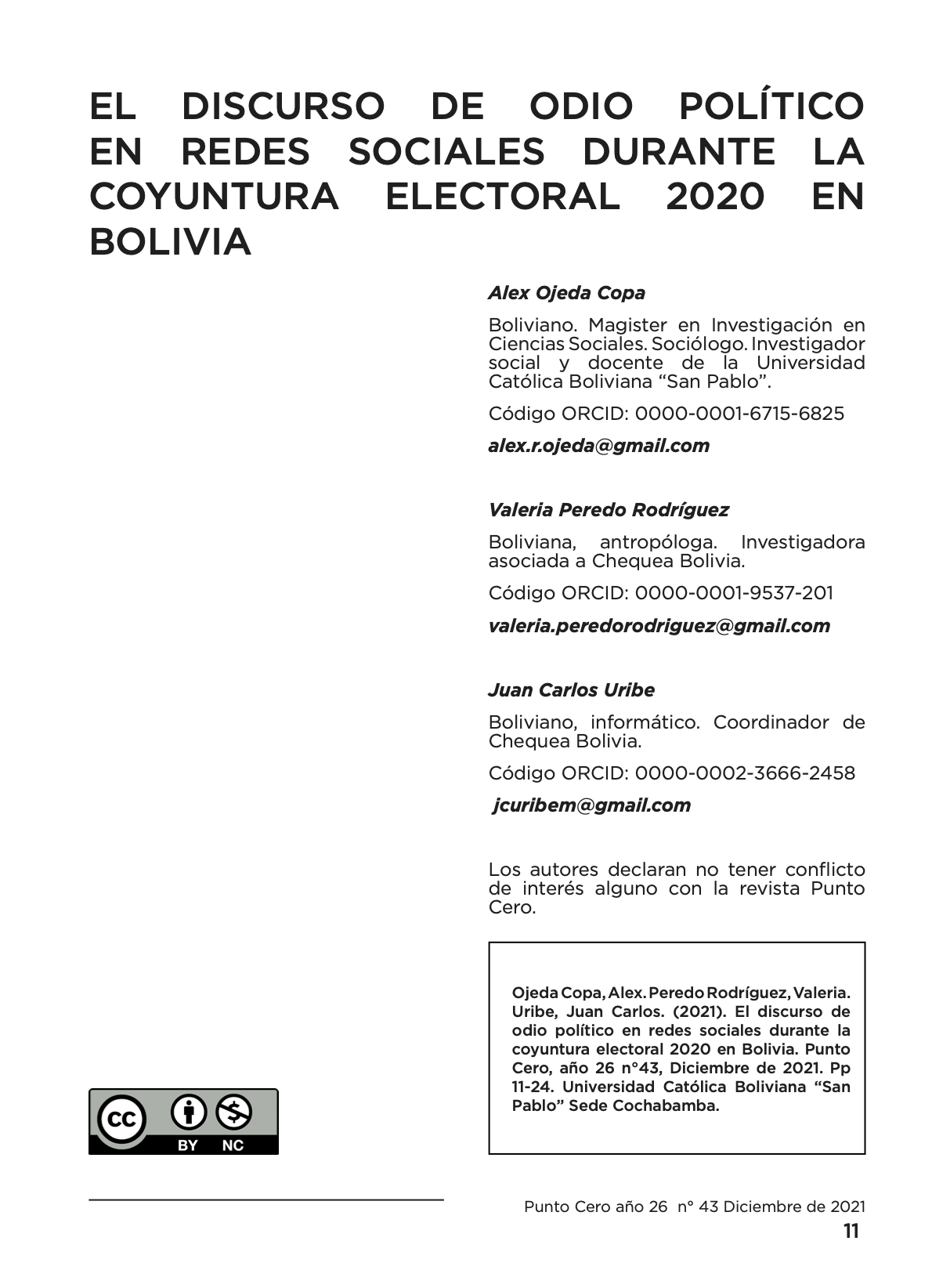Political hate speech on social networks during the 2020 electoral juncture in Bolivia
DOI:
https://doi.org/10.35319/puntocero.202143177Keywords:
Hate Speech, Social Networks, Elections, Digital Conversation, BoliviaAbstract
The objective of this article is to analyze and characterize the hate speech of political content emitted on social networks during the electoral campaign of the 2020 General Elections in Bolivia. We focus on a sample of the textual speeches made by voters during the month of September and October 2020 in groups and Facebook pages. While each of the political parties in dispute tries to blame and demonize its opponent, simultaneously trying to purify itself, we find evidence that shows that hate speech is present on both sides. This speech makes reference to supposed homogeneous social blocs, such as the “masistas” and “pititas”, which are gradually subjected to offenses, hostility, essentialization and justification of physical violence. At the same time, we propose possible alternatives for democratic conversation.
References
Anderson, B. (1993). Comunidades imaginadas. México: Fondo de Cultura Económica.
Benesch, S. (2012). Dangerous speech: A proposal to prevent group violence.
Voices That Poison: Dangerous Speech Project. Dangerous Speech Project.
Durkheim, É. y Marcel M. (1971). De ciertas formas primitivas de clasificación, en Marcel Mauss,Obras II. Institución y culto. Barcelona: Barral.
Dangerous Speech Project (2020). Dangerous speech: A practical guide. https://dangerousspeech.org/guide/
Foucault, M. (1982). Post-scriptum. Beyond Structuralism and Hermeneutics. H. L. Dreyfus y P. Rabinow (Eds.). Chicago: The University of Chicago Press
Foucault, M. (1999). El orden del discurso. Barcelona: Tusquets.
Faletto, E. (1993). Formación histórica de la estratificación social en América Latina. Revista de la CEPAL. DOI: https://doi.org/10.18356/4cb5644c-es
Geertz, C. (1987). Descripción densa: hacia una teoría interpretativa de la cultura. La interpretación de las culturas. Barcelona: Gedisa.
Harari, Y. N. (2014). Sapiens. De animales a dioses: Una breve historia de la humanidad. Barcelona: Debate.
Laclau, E. (2002). El análisis político del discurso: entre la teoria de la hegemonía y la retórica. DeSignis, (2)
Mamdani, M. (2000). When victims become killers: Colonialism, nativism, and the genocide in Rwanda. Princeton University Press. DOI: https://doi.org/10.1515/9781400851720
Ojeda, A y Peredo, V. (2020) . Convergencia entre desinformación política y social en el conflicto electoral de 2019 en Bolivia. Temas Sociales 46.
Olson, G (2020). Love and Hate Online. Affective Politics in the Era of Trump. Violence and Trolling on Social Media: History, Affect, and Effects of Online Vitriol, 153-177. DOI: https://doi.org/10.2307/j.ctv1b0fvrn.11
Schmitt, C. (1992). El concepto de lo político. Madrid: Alianza.
Van Dijk, T. (2001). Discurso y racismo. Persona y sociedad, 16(3), 191–205.

Downloads
Published
How to Cite
Issue
Section
License
Copyright (c) 2021 Revista Punto Cero

This work is licensed under a Creative Commons Attribution-NonCommercial 4.0 International License.








